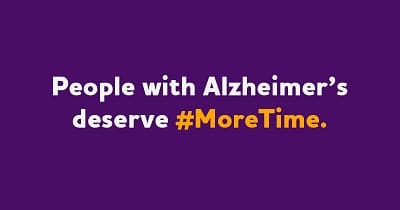“It’s Time for More Time”
With the #MoreTime campaign, the Alzheimer’s Association has gone all in on aducanumab, the controversial new Alzheimer’s drug produced by Biogen and Eisai.
With about a month to go before the FDA is expected to decide the future of Eisai and Biogen’s aducanumab, the Alzheimer’s Association today launched a campaign to support approval for the drug.
The campaign included full-page advertisements in the Wall Street Journal and USA Today declaring “it’s time for more time” for people living with Alzheimer’s. The advertisements are an open letter from Harry Johns, Alzheimer’s Association President and CEO.
“More than six million Americans are estimated to be living with Alzheimer’s today and everyone who has the disease will die of it or with it,” Johns writes. “There are no survivors.”
Johns noted that it has been 18 years since the FDA approved a treatment for Alzheimer’s. And there are no approved treatments that stop or slow progression of the disease.
In a conference call with Alzheimer’s Association volunteers, Johns and Dr. Maria Carrillo, the Association’s chief science officer, explained that aducanumab is believed to be a disease-modifying drug, meaning that it can slow the progression rather than only treat symptoms.
The association said that a clinical trial of aducanumab reported a 22 percent reduction in cognitive and functional decline compared to a placebo.
Aducanumab remains somewhat controversial in the research and scientific community. Following a strong phase two trial, the companies launched two parallel phase three trials only to cancel them midway through after a “futility analysis” showed that the drug was not meeting its goals.
After a few months, however, the companies stunned the Alzheimer’s community when they announced that a re-analysis of data showed the drug was indeed working. They started a new trial of the drug and said they would seek the FDA’s approval of aducanumab.
The drug’s next hump arrived when an FDA advisory panel last November overwhelmingly said that the drug makers had failed to prove that aducanumab is an effective treatment for Alzheimer’s. The committee suggested that the FDA should require Biogen and Eisai to run another large clinical trial of the drug.
But the Alzheimer’s Association has not wavered from its support for the drug.
“As a science-driven organization,” Johns said, “the Alzheimer’s Association believes the FDA must consider all available scientific data in its review — the trials of this treatment, research from other Alzheimer’s trials, all dimensions of expert opinion and applicable guidance.”
Asked about the advisory panel decision during the conference call, Carrillo explained that the panel only had a small slice of data to examine before making its recommendations. When scientists take all of the known data into account, she said, “you’ll find the science is sound.”
“Those who have terminal cancers and other fatal diseases, and their loved ones, have benefited from approvals of treatments that have equivalent effects to extending function for those with Alzheimer’s,” Johns said in his letter. “To deny those who face Alzheimer’s, and their loved ones, that same opportunity — to have more precious time together — would be neither equitable nor humane.”
In addition to the full-page ads, the association said it has purchased full digital takeovers of the Wall Street Journal and USA Today online properties. It is also launching campaigns on Twitter, Facebook, Instagram and LinkedIn.
More information on the #moretime campaigns can be found here.
The author of this article is a participant in the Aducanumab trial and is a member of the Board of the Delaware Valley Chapter of the Alzheimer’s Association.




Anything that helps is most welcome. Press on! We need all the hope the scientific community can help us muster